Peter Oborne’s attack on the management of the Daily Telegraph for downplaying the latest HSBC scandal raises interesting insights into a wider malaise within business journalism. On one side stands The Guardian, helping to expose widespread tax evasion, and on the other the Daily Telegraph management, accused of deliberately suppressing the story for commercial interests. Which best represents the state of financial and business journalism in the UK?
In research I carried out for my forthcoming book on corruption and collusion in business journalism, I found that the Telegraph carries more business coverage than any of its competitors. A newspaper like the Telegraph is trusted by its readers, they expect it to tell the truth and because business news is so central to the paper’s offering, if Oborne is correct then what we are seeing is a betrayal of their trust. Why should they trust it again? How much more is driven by commercial pressures?

It’s no secret that the traditional business model of newspapers has broken down. Papers were always a dual product, a combination of editorial which attracted readers, and a platform which attracted advertising because of a newspaper’s circulation. However, falling circulation has reduced the attraction for advertisers which has resulted in falling revenues and cost-saving measures. This is why advertisers are keenly fought over, with the danger that they can influence editorial decisions.
Faced with financial constraints and the challenge posed by digital delivery platforms, newspaper owners have responded by cutting costs. As the most expensive element of a newspaper is the editorial, it is journalists who have borne the biggest brunt in terms of lost jobs. My forthcoming research shows employment in the UK’s mainstream print sector shrank by between a quarter and a third from a baseline estimated in 2001 of 55,000-60,000 jobs to around 40,000 in 2010.
In an interview for my book, the Guardian’s online editor, Julia Finch, told me:
Because of the reporting timescales we tend to cover companies reporting their results, all we can do these days is report results, analysis takes longer and is more expensive. More demands on the journalist and less time to actually do the checking. This is going to get far worse because of the economics of the media industry.
Due to the increased volume of work and the limited amount of time available to produce stories, journalists have changed from a hunter-gatherer of stories to data processors. Increasingly this means having to rely on external sources for both the source of the stories and their content.
We need better business journalism
Why does this matter? We need critical financial and business journalism because of the way our relationship with business has changed. Over the past 30 years the power of the state and the trade unions, which used to protect society from the predatory activities of business, has rapidly diminished.
At the same time, politicians have rebalanced the economy. Services that were once provided by public sector have been outsourced to private companies. Many of these are multinational corporations owned by offshore shareholders.
We live and work in a global economy – Amazon, Starbucks, Google are major household names everywhere and while we might welcome their services we have learnt there is a cost. There has been outrage at the tax avoidance schemes carried out by many of global companies and HSBC is only the latest example.
In the past, it has been business reporters in newspapers who have been at the forefront of exposing these activities, thereby demonstrating the importance of such reporting. But what happens when companies have enough sway to affect that reporting?
Safe conduits
My experience in financial journalism provides too many examples of journalists colluding with businesses in order to present a positive or less critical aspect. Such “safe conduits” possess impeccable credentials and are trusted by business to become the channel through which their opinions are expressed.
The conduits are also used by pro-business lobby groups and think tanks to act as cheerleaders for political and economic causes that they argue affect business interests.
Business journalism matters because it helps dictate the political agenda. The so-called “war on red-tape” and the 50p tax campaign are issues that started in the business pages and which were then translated into legislation. Increasingly this means that policy on key issues are decided not through democratic institutions but in the boadrooms of UK plc in the service of their own interests.
It has to be asked whether such an uncritical acceptance of business is either healthy or good for business. What type of friend is it that does not hold you to account when you do wrong, applauding misdemeanours and dubious practice as being essential business activity? What kind of friend let you precipitate an economic crisis or seeks to excuse or apologise for behaviour that might elsewhere be regarded as criminal?
If our newspapers reported on politics or politicians in such an uncritical fashion, we would quickly dismiss it as propaganda. Peter Oborne’s resignation has been the wake-up call we needed about the undue influence business has on journalism.

